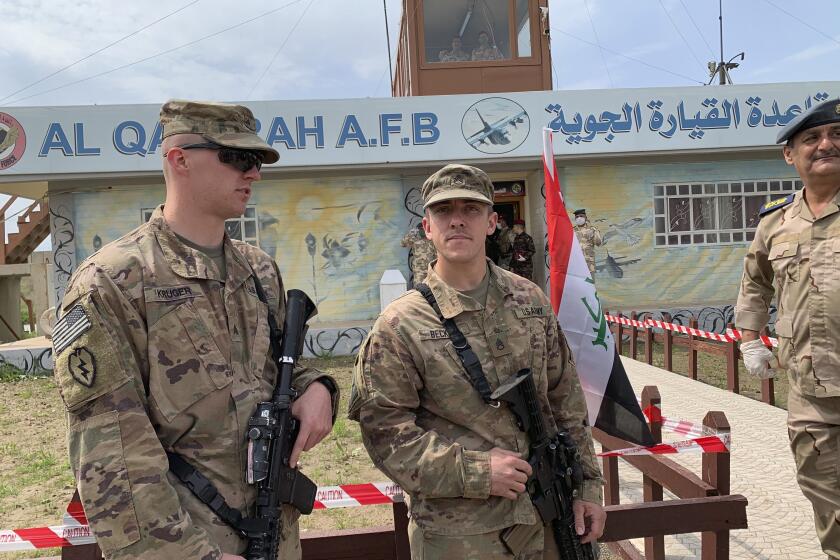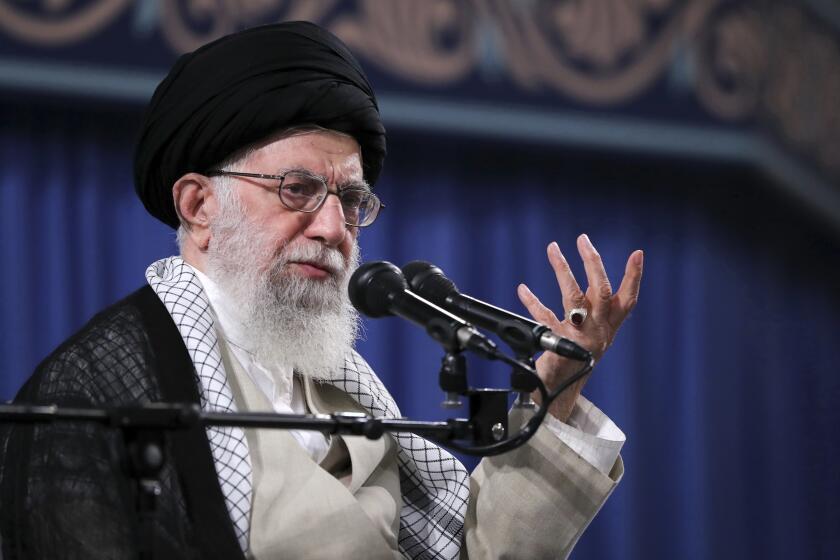‘The American Lafayette of Iran’: How a young Nebraskan became an Iranian hero
- Share via
TABRIZ, Iran — Fervent cries of “Death to America,” endless castigations of the “Great Satan” and frequent comparisons to dogs and pigs — Iran’s leaders rarely have a good word for the U.S. But there’s one American who to this day is revered in the Islamic Republic, and who even has his own statue in this northwestern Iranian city: Howard C. Baskerville.
He was a young idealist from Nebraska who came here to teach and ended up fighting — and dying — in Iran’s first revolution, an uprising against an oppressive monarchy that he found similar to America’s own quest for independence. More than a century later, many still call Baskerville “the American Lafayette of Iran” and invoke his name in hopes of a return to a time when their country and the U.S. were friends, not foes.
“His popularity never stops growing,” says Mohsen Rahimi Qazani, a teacher and a Baskerville fan in Tabriz.
“In the hearts and minds of our people he’s a true saint with all the virtues a classic Persian hero should have: standing up to oppression, never faltering despite being outnumbered by the enemy.”
That image has made Baskerville an icon that has survived the tumult of modern-day relations between Washington and Tehran. In 2005, then-Iranian President Mohammad Khatami gave Baskerville pride of place in Tabriz’s Constitution House, unveiling a bust of the American that was installed with little objection from the country’s hard-line politicians. The inscription in Persian at the bottom calls him a “patriot” and “history maker.”
Every March or April, Qazani says, people from all over Iran who come to enjoy Tabriz’s traditional bazaars and its red and turquoise mosques still take a moment to commemorate the anniversary of Baskerville’s death and lay wreaths on his tomb in the Assyrian Cemetery.
Hit by pandemic exhaustion and plummeting incomes, Iran’s healthcare professionals are emigrating in big numbers when the country can least afford it.
“I’m going through paperwork now to open up a cafe and restaurant named after Baskerville in the Grand Bazaar area,” says Mohammad Shahdad, a 34-year-old tour guide.
Baskerville’s story harks back to 1907, a time when Iran — the Western world still called it Persia at the time — and the U.S. were distant friends and the American Revolution served as an inspiration for Iranians. A graduate of Princeton’s Theological Seminary, Baskerville, then 23, decided to delay his entry to ministry and left for Tabriz to teach several subjects and coach tennis and equestrianism at a Presbyterian missionary school. It was a job at which colleagues said he was successful.
Iran was in the midst of a full-scale confrontation pitting the Russian- and British-backed Shah Mohammad Ali against the so-called constitutionalists — those who had forced the shah’s father to accept a constitutional monarchy, the creation of a Majlis (or parliament) and the drafting of the constitution, which the shah had suspended after taking power.
In 1908, the shah launched a coup. He dispatched his Cossack brigades to bombard the Majlis in Tehran and snatched back the reins of government. Royalists were gaining ground, except in Tabriz, which refused to surrender. The shah responded by laying a crushing siege on the city.
The U.S. troop withdrawals from Iraq and Afghanistan are forcing military leaders to find other ways to deter potential attacks by Iran and its proxies, and to counter arguments that America is abandoning the region.
Baskerville, no mere observer, saw common cause between the constitutionalists’ fight for democratic freedom and the ideals of the American Revolution. He became more deeply involved in the defense of the city and — drawing on his military service in the U.S. — organized about 150 of his students into a militia to aid Sattar Khan, the head of the constitutionalists’ forces, in March 1909. His actions dismayed the U.S. consul in Tabriz, William F. Doty, who insisted that, as an American citizen, Baskerville had no right to interfere with the country’s internal politics.
“You are here to act as a teacher and not as a revolutionary,” Doty said, according to a tribute to Baskerville published by one of his students, S.R. Shafagh, 50 years later.
“I cannot remain and watch indifferently the sufferings of a people fighting for their right,” Baskerville replied. “I am an American citizen and am proud of it, but I am also a human being and cannot help feeling deep sympathy with the people of this city.”
To the consul’s wife, he said: “The only difference between me and these people is my place of birth, and this is not a big difference.”
How some Iranians in exile are smuggling banned books into Iran while inspiring the next generation of writers
By the 10th month of the siege, in April 1909, Tabriz residents were facing famine. In desperation, Baskerville led a group of fighters to slip past the blockade and smuggle in food. The first mission failed. When Baskerville tried a second time, a sniper’s bullet ripped right through his heart. He was 24.
Thousands turned out to honor him at his funeral in Tabriz, where he was buried in what was then called the American Cemetery. Khan sent a rifle engraved with Baskerville’s name and draped in a Persian flag to his parents. In a telegram, Khan wrote: “Persia much regrets the honorable loss of your dear son in the cause of liberty.”
“We give our parole that future Persia will always revere his name in her history like that of Lafayette in America and will respect his venerable tomb,” he wrote.
The comparison to the Marquis de Lafayette, the French nobleman who took up arms alongside the American colonists, stayed with the Nebraskan. Baskerville was also declared a shaheed, or martyr.
Baskerville devotees aren’t exclusive to the city of Tabriz. There are dozens of Iranian websites commemorating his sacrifice. In the city of Zanjan, about 160 miles southeast of Tabriz, engineer Saaya Heidari recently launched the Baskerville luxury knife brand.
“My main motive is giving him the honor he deserves on behalf of Iran,” Heidari says.
For others, Baskerville’s name remains a potent symbol of the amity that once subsisted between the U.S. and Iran — and that could yet be revived one day.
“Our history with the U.S. doesn’t start with the 1953 coup,” wrote Seyed Hossein Mousavian, a reformist politician and former diplomat, referring to the Washington-backed overthrow of then-Iranian Prime Minister Mohammad Mossadegh, which strengthened the rule of the reigning shah.
“It starts with the honorable Howard Baskerville.”
Special correspondent Khazani reported from Tabriz and staff writer Bulos from Beirut.
More to Read
Sign up for Essential California
The most important California stories and recommendations in your inbox every morning.
You may occasionally receive promotional content from the Los Angeles Times.













